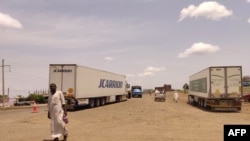U.N. statistics show Sudan has become the world's fastest-growing displacement crisis since conflict erupted in the Northeast African nation between the Sudanese Armed Forces, SAF, and the paramilitary Rapid Support Forces, RSF, in April.
Clemetine Nkweta-Salami, the U.N. resident and humanitarian coordinator in Sudan said the conflict has upended millions of Sudanese while causing untold suffering and despair.
"I have met mothers in Sudan who have told me they do not know where to find the next meal for their children," Nkweta-Salami said.
"I have met families sleeping in makeshift shelters, struggling to find food and water, unable to access health care, their children out of school and the family breadwinners out of work,” she added.
The U.N. authority said half of Sudan's 24.7 million people need aid and protection.
70% of Sudan's hospitals are not functioning, sexual and gender-based violence is rampant, disease and hunger is on the rise, she added.
Nkweta-Salami said the warring generals continue to violate promises to de-escalate fighting.
SAF and RSF have jointly agreed to at least nine cease-fire agreements that were brokered by the U.S. and Saudi Arabia.
Washington and Riyadh failed to negotiate the cessation after holding talks in May and June in the city of Jeddah.
All agreements to halt hostilities have failed, after the rivals accused each other of violating the cease-fires.
Nkweta-Salami said "the parties meeting in Jeddah committed to de-escalate the fighting, minimize civilian harm and refrain from any disproportionate attacks. But since then, the killing of civilians has continued in Khartoum, in Nyala, in Al Fasher, and other areas.”
She said U.N. agencies have been able to deliver aid to at least 3.6 million people through two main access points, Port Sudan and from Chad to Darfur.
More people could be reached if these efforts were not hampered by bureaucratic obstacles, forced checks of humanitarian trucks and criminal activities such as the looting of trucks by armed groups, she added.
The United Nations and other international bodies warn that Sudan’s conflict risks becoming a protracted crisis that may have a spillover effect in the region should it continue.

Forum